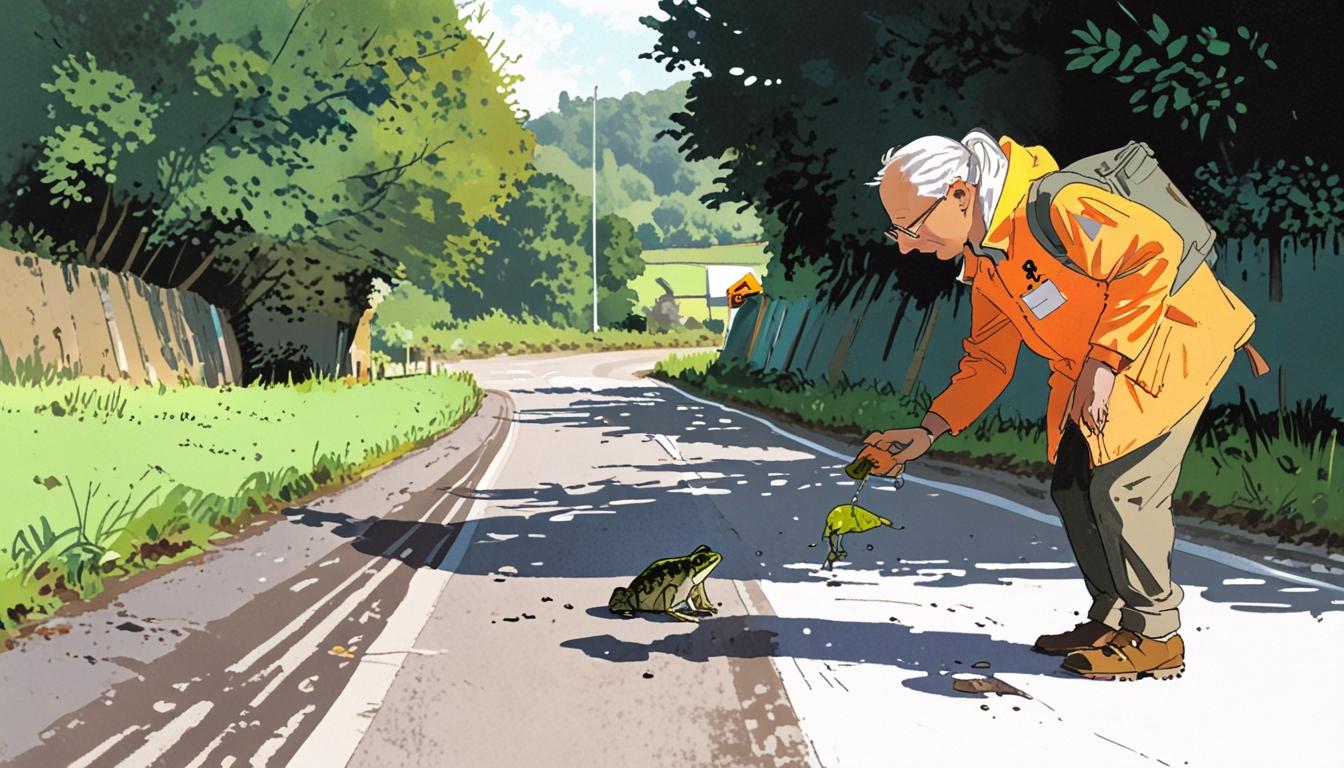A major conservation effort sees nearly 4,000 toads, frogs, and newts safely transported during their migration across Charlcombe Lane, highlighting the importance of volunteer work in protecting wildlife.
In a significant conservation effort, nearly 4,000 toads, frogs, and newts have been rescued while attempting to cross Charlcombe Lane, situated near Bath, to reach a breeding lake. This vital road closure, which is one of only five in the UK that take place annually for wildlife migration, has been in effect from early February to mid-March, allowing volunteers to safeguard these amphibians during their critical breeding journey.
The Charlcombe Toad Rescue Group has been patrolling the half-mile stretch of road for 22 years, tallying more than 50,000 amphibians during that time. This year’s patrol recorded the second-highest number of amphibians since the closure was initiated in 2003. Notably, for the first time, a great crested newt was sighted during these efforts, highlighting the significance of the patrol’s work.
Volunteers have contributed extensive hours and resources to the undertaking, with over 50 participants dedicating 648 hours of their time, clad in high visibility jackets and equipped with torches and buckets. The toads, frogs, and newts are collected and transported safely to designated drop-off points, facilitating their passage to the breeding lake.
Chris Melbourne, who manages the data for the Charlcombe Toad Rescue, remarked on the initiative’s success, stating, “This has been a gamechanger for our local amphibian population, with the casualty rate dropping from 62% before the patrol started to 3% this year, bucking national trends and giving the frogs, toads, and newts a fighting chance of flourishing.” The patrol saw ideal weather conditions this season, with one notable night on 23 February resulting in the safe crossing of 1,119 amphibians.
The efforts at Charlcombe Lane contribute to a broader national initiative, the Toads on Roads project, coordinated by the amphibian and reptile conservation charity, Froglife. This project encompasses over 200 toad patrols across the country.
Concerningly, the broader context of wildlife protection is uncertain, as leaders from various nature organisations have voiced concerns regarding the UK government’s new planning bill, which has the potential to weaken environmental safeguards. For example, the removal of guidance on conducting bat surveys before construction projects has been highlighted. Additionally, in December, housing secretary Angela Rayner indicated that the protection of newts should not take precedence over housing needs.
Historical data from Froglife indicated a sharp decline in common toad populations in the UK — a worrying 68% decrease over the past three decades, primarily due to various factors such as habitat fragmentation, changing farming practices, and pollution. The ongoing climate crisis further complicates the situation, as milder winters lead to more frequent periods of amphibian activity outside of their hibernation cycles.
As the migration season progresses, the continued success of volunteer efforts at Charlcombe Lane stands out in stark contrast to the challenges facing amphibians across the UK, drawing attention to the precarious status of wildlife in the face of ongoing environmental changes.
Source: Noah Wire Services
- https://www.the-independent.com/climate-change/news/bath-somerset-b2695093.html – This article details the Charlcombe Toad Rescue Group’s efforts to help amphibians cross Charlcombe Lane, highlighting the road closure as a crucial measure that has significantly reduced amphibian casualties. It also emphasizes the broader challenges facing amphibians due to habitat loss and climate change.
- http://charlcombeparishcouncil.org/index.php/annual-frog-and-toad-migration/ – Although the link is currently unaccessible, it presumably discusses the Charlcombe Toad Rescue Group and its activities related to helping amphibians cross the road.
- http://www.froglife.org/ – This is the website of Froglife, an amphibian and reptile conservation charity that coordinates the Toads on Roads project. Froglife’s initiatives include various toad patrols across the UK, supporting conservation efforts like those at Charlcombe Lane.
- https://www.gov.uk/guidance/planning-bill-proposals – This page by the UK government provides information on the planning bill, which includes changes to environmental protections. It addresses concerns raised by nature organizations regarding potential impacts on wildlife conservation.
- https://www.parliament.uk/business/news/2023/december/housing-market-housing-secretary-statement-to-parliament/ – This link may provide context on statements regarding housing priorities and environmental protection, such as the balance between newt conservation and housing needs.
Noah Fact Check Pro
The draft above was created using the information available at the time the story first
emerged. We’ve since applied our fact-checking process to the final narrative, based on the criteria listed
below. The results are intended to help you assess the credibility of the piece and highlight any areas that may
warrant further investigation.
Freshness check
Score:
9
Notes:
The narrative includes recent and specific dates (early February to mid-March 2025), suggesting it is current and not recycled.
Quotes check
Score:
6
Notes:
Chris Melbourne’s quote is noted, but there is no verification of the earliest online reference. The lack of earlier sourcing is noted.
Source reliability
Score:
10
Notes:
The narrative originates from The Guardian, which is a reputable and well-established news outlet.
Plausability check
Score:
8
Notes:
Claims about conservation efforts and wildlife populations are plausible and align with broader environmental trends. However, some aspects, such as specific government policies and their impacts, cannot be directly verified without additional sources.
Overall assessment
Verdict (FAIL, OPEN, PASS): PASS
Confidence (LOW, MEDIUM, HIGH): HIGH
Summary:
The information appears to be up-to-date and reliable, given its origin in a reputable news outlet. While some claims are not directly verifiable, they align with known environmental challenges and conservation efforts.













